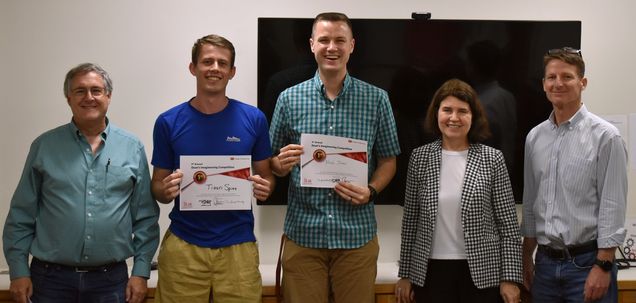Robotics master’s students win Singh Lab contest
By Patrick L. Kennedy
Noah Jones and Tiaan Spies, both first-year master’s students in robotics & autonomous systems, won the 2023 Imagineering Competition with their project, Creative Arm for Robotic Learning (CARL), a fun, tactile way to teach kids about computer science and mathematics.
In the year-long Imagineering Competition, teams of students use machinery and tools in the Binoy K. Singh Imagineering Laboratory, along with a small stipend for additional materials, to design and build original technological solutions to societal problems. Both chess enthusiasts, Jones and Spies wanted to apply what they were learning in class to a real-life robotic chess opponent, which they soon realized could also bolster lessons in computer programming, linear algebra, and other STEM topics, perhaps helping to prepare today’s students for the growing market for jobs in computer science.
“It’s so much more fun to learn to code when you can type something in a computer and then watch it change the physical world around you, than to just see something change on a screen,” Jones said during the duo’s presentation to the contest judges, Professor of the Practice Diane Joseph-McCarthy (BME), Senior Associate Dean for Finance and Administration Richard Lally, and Professor Thomas Little (ECE, SE).
Jones and Spies built CARL for under $150, using recycled paper towel tubes, a Servo motor, a Raspberry Pi camera, and parts they created on a 3D printer. The arm is lightweight and safe, yet capable of picking up and moving chess pieces. And the system integrates imaging with machine learning to detect the position of chess pieces and strategize moves.
For their creativity, the quality of their prototype, the functionality of the project and its potential to impact society, the judges awarded Jones and Spies first prize: $3,000, plus assistance with patent submission and marketing analysis. Ultimately, the students plan to make their files and detailed instructions available online, so that educators can easily build their own CARL systems with similarly low budgets and 3D printers, which are now accessible at many schools and libraries.
“We’re just very grateful to have had the chance to present, and to receive an award for a project that we both wanted to do anyway,” said Jones after the contest. “And [Lab Manager] Katie Kelso and the Imagineering Lab deserve a huge shout-out for providing a space and resources for us to have so much fun the last few months.”
ECE student Peng Qiu (’24) earned second prize—$1,500 as well as patent and marketing help—for BU PlannerX, a course planning tool. Several teams won $250 awards for best-in-class projects: BME PhD students Roman Addokhi and Rohin Banerji; ME seniors Hoshing Lau and Jainil Surelia; ME juniors Zizai Ma, Peng Qiu, Nathan Sun, and ZhongHao Wei; and freshmen Todd Lee-Millstein (ME) and Peter Zhao (ECE).

